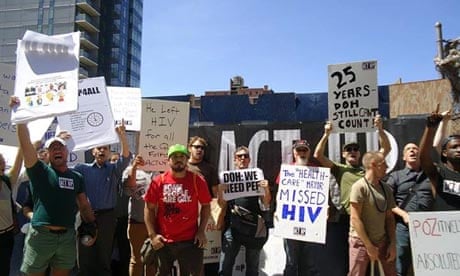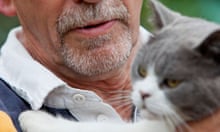Two years ago, James Krellenstein had unprotected sex. Luckily, the 22-year-old knew exactly what to do. The next day, he took a train from his parents' house on Long Island to see a doctor at Bellevue Hospital in New York City. The doctor prescribed James PEP – a strong combination of drugs usually prescribed for people who already have HIV.
Months later, Krellenstein found out his partner from that night was indeed HIV-positive. But James remained negative. PEP's little-known effectiveness in preventing the virus taking hold in someone's body has led it to be dubbed the "morning-after pill for HIV".
Yet Krellenstein's experience remains rare. While the idea of treating people who may have been exposed to HIV with PEP has gained ground among doctors and activists over the last few years, most local governments in the United States have yet to implement a comprehensive PEP distribution or education program. That's left many who are most at risk from contracting HIV unaware the option even exists.
Now, as HIV diagnoses continue to rise among gay men, activists and experts are urging governments to invest money in PEP awareness campaigns and treatment programs. Otherwise, they say, many communities might be heading for a new HIV and AIDS crisis in coming years.
"We're going to have to deal with [HIV] one way or another," said Krellenstein, a member of the HIV awareness and activism group Act Up. "And I'd rather do it on the prevention side rather than waiting for everyone to be positive."
Krellenstein's concern about "everyone" contracting HIV may sound like hyperbole. But if current infection rate trends continue, 54% of all men who have sex with men (MSM) will have HIV by the time they are 50, according to a 2009 University of Pittsburgh study. Among African American men who have sex with men, half will have HIV by the time they are 35.
And while contracting HIV is no longer a death sentence, many worry that the increasing incidence of infection will burden the already-strained US healthcare system. The lifetime cost of treating someone with HIV can reach over $1m.
Those staggering numbers are what's led groups like Act Up to campaign for increased funding for PEP, and increased awareness within the gay community.
Act Up's involvement is notable. The group made a name for itself pushing for politicians to take the HIV crisis seriously in the 1980s. But as treatment for HIV improved, gay marriage and other social issues replaced health at the forefront of the LGBT rights movement, and Act Up faded from view. Now, the group has found renewed purpose in calling notice to the increasing prevalence of HIV and the lack of funding for unorthodox solutions like PEP.
While no one in Act Up thinks PEP is a cure-all in the ongoing fight to stop the spread of HIV, many believe it's a missing piece in comprehensive "prevention pipeline" that includes condoms, regular testing, and education.
"A lot of young gay guys, even well-informed ones, don't know a lot about HIV," said Jim Eigo, an activist with Act Up who also petitioned governments to take action on HIV in the 1980s. "We've got to open up the eyes of the gay community ... and say if you're HIV-negative, there's an individual value and a community value in staying that way."
PEP is essentially the same kind of treatment someone diagnosed with HIV might get, but on a condensed timeline: a doctor prescribes one class of drug that blocks HIV from entering a person's cells, and another that prevents HIV from replicating itself. The combined drugs are available as the patented pill Truvada, which is made by Gilead Sciences, and is one of the most commonly prescribed PEP regimens.
There are few comprehensive studies on the effectiveness of PEP in preventing HIV infection, but experts believe it can reduce the transmission of the virus by around 70% if the regimen is started within 72 hours of exposure – hence the "morning-after pill" label.
But as with the morning-after pill, critics of PEP have suggested that its availability could encourage risky behavior. Some defenders of PEP say that's not true, pointing out that taking a month-long course of medication with potentially strong side-effects is deterrent enough.
Beyond the moral controversies, one of the biggest threats to PEP's widespread availability is money. A month-long regimen of Truvada costs thousands of dollars, essentially making it off-limits to low-income Americans without health insurance.
In New York and virtually every other city across the country, poor people and people of color are much more at-risk for contracting HIV, but partially because of its cost, those aren't the communities PEP is reaching.
"If you compare our newly diagnosed patients here, the majority of them are African American and lack insurance," said Antonio Urbina, a medical director of the Spencer Cox Center for Health in Manhattan's historically gay-friendly Chelsea neighborhood. "But the majority of people coming in for PEP are white and have insurance. Unless there's access to payment for these medications, it's just going to remain the status quo."
Activists point out that the upfront cost of a pill like Truvada is nowhere near the lifetime cost of a government treating someone with HIV. Some PEP supporters even advocate for promiscuous gay men to stay on a lifetime regimen of Truvada as a preventative measure against HIV, despite its cost and side-effects.
Still, heath departments nationwide seem tepid about the slightest investment in PEP.
James Krellenstein and his fellow activists are hoping to change that. Over the past few months they've met with New York City's health officials in an attempt to convince them to roll out a comprehensive PEP awareness campaign, and increase funding for PEP programs.
But it remains to be seen how receptive the cash-strapped health department will be to spending untold thousands on education and outreach. The New York City Department of Health and Mental Hygiene declined to comment for this story.
And beyond the walls of government, there's perhaps an even bigger challenge for activists: getting at-risk communities to care. Activists say the fact that HIV is no longer a death sentence has been a double-edge sword for the gay community. In the 1980s, people were motivated by the fear of death to take prevention seriously. Now, with less stigma and less pain attached to an HIV diagnosis, there's simply less to be motivated by. Krellensten says: "The number one challenge is getting gay people interested in this."



Comments (…)
Sign in or create your Guardian account to join the discussion